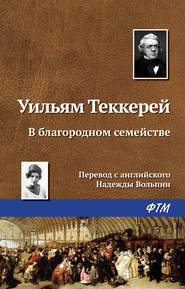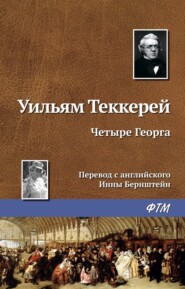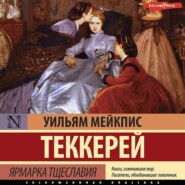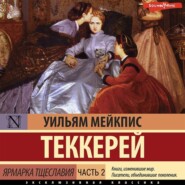По всем вопросам обращайтесь на: info@litportal.ru
(©) 2003-2024.
✖
Ярмарка тщеславия / Vanity Fair
Автор
Год написания книги
2017
Теги
Настройки чтения
Размер шрифта
Высота строк
Поля
George was so occupied with his new acquaintances that he and William Dobbin were by no means so much together as formerly. George avoided him in public and in the regiment. As Dobbin upon those days when he visited the Osborne house, seldom had the advantage of meeting his old friend, much painful and unavailing talk between them was spared. Our friend George was in the full career of the pleasures of Vanity Fair.
On the appointed night, George drove to the famous ball, where his wife did not know a single soul. After placing Amelia on a bench, he left her to her own thoughts there. Her thoughts were not of the pleasantest, and nobody except honest Dobbin came to disturb them. Whilst her appearance was an utter failure[20 - В то время как ее появление было полным провалом] (as her husband felt with a sort of rage), Mrs. Rawdon Crawley’s debut was, on the contrary, very brilliant. She arrived very late. Her face was radiant; her dress perfection.
George danced with Rebecca twice or thrice – how many times Amelia scarcely knew. At last George came for Rebecca’s shawl and flowers. She was going away. She did not even come back and say good-bye to Amelia. The poor girl let her husband come and go without saying a word, and her head fell on her breast.
“William,” she said, suddenly clinging to Dobbin, who was near her, “you’ve always been very kind to me – I’m – I’m not well. Take me home.” He went away with her quickly.
George led Becky to the coach and passed her a bouquet of flowers in which there lay a letter. In this letter Amelia’s faithful husband asked Becky to elope with him and search for a new life. Osborne, wild with elation, went off to a play-table, and began to bet frantically.
“Come out, George,” said Dobbin, still gravely; “don’t drink.”
“Drink! there’s nothing like it. Drink yourself, and light up your lantern jaws, old boy. Here’s to you.”
Dobbin went up and whispered something to him, at which George walked away speedily on his friend’s arm. “The enemy has passed the Sambre,” William said, “and our left is already engaged. Come away. We are to march in three hours.”
George thought over his brief married life. How wild and reckless he had been! How unworthy he was of her. He sat down to write a letter to his father. George came in and looked at her again, entering still more softly. By the pale night-lamp he could see her sweet, pale face. Good God! how pure she was; how gentle, how tender, and how friendless! and he, how selfish, brutal, and black with crime! God bless her! God bless her! He came to the bedside, and bent over the pillow noiselessly towards the gentle pale face.
Two fair arms closed tenderly round his neck as he stooped down. “I am awake, George,” the poor child said, with a sob fit to break the little heart that nestled so closely by his own. She was awake, poor soul, and to what? At that moment a bugle from the Place of Arms began sounding clearly, and was taken up through the town; and amidst the drums of the infantry, and the shrill pipes of the Scotch, the whole city awoke.
13
Thus all the superior officers being summoned on duty elsewhere, Jos Sedley was left in command of the little colony at Brussels.
The following days were the grave ones. Only Rebecca had the heart to proceed with her affairs of flirting with Jos and searching for new sources of income. Darkness came down on the field and city: and Amelia was praying for George, who was lying on his face, dead, with a bullet through his heart.
The news which that famous Gazette brought to the Osbornes gave a dreadful shock to the family and its chief. The girls indulged unrestrained in their grief. The gloom-stricken old father was full of sorrow. Sometimes a shuddering terror struck him, as if he had been the author of the doom which he had called down on his son. There was a chance before of reconciliation. The boy’s wife might have died; or he might have come back and said, Father I have sinned. But there was no hope now. And it is hard to say which pang it was that tore the proud father’s heart most keenly – that his son should have gone out of the reach of his forgiveness, or that the apology which his own pride expected should have escaped him.
About three weeks after the 18th of June, Mr. Osborne’s acquaintance, Sir William Dobbin, called at Mr. Osborne’s house in Russell Square, with a very pale and agitated face, and insisted upon seeing that gentleman. He took out a letter sealed with a large red seal. “My son, Major Dobbin,” the Alderman said, with some hesitation, “dispatched me a letter by an officer. My son’s letter contains one for you, Osborne.” The Alderman placed the letter on the table, and Osborne stared at him for a moment or two in silence.
The poor boy’s letter did not say much. He had been too proud to acknowledge the tenderness which his heart felt. He only said, that on the eve of a great battle, he wished to bid his father farewell, and solemnly to implore his good offices for the wife – it might be for the child – whom he left behind him. He thanked his father for his former generous conduct; and he promised him that if he fell on the field or survived it, he would act in a manner worthy of the name of George Osborne. His English habit, pride, awkwardness perhaps, had prevented him from saying more. His father could not see the kiss George had placed on his letter. Mr. Osborne dropped it with the bitterest, deadliest pang of affection and revenge. His son was still beloved and unforgiven.
If the sisters had any anxiety regarding the possible recognition of Amelia as a daughter of the family, it was increased presently, and towards the end of the autumn, by their father’s announcement that he was going abroad. He did not say whither, but they knew at once that his steps would be turned towards Belgium, and were aware that George’s widow was still in Brussels.
As after the drive to Waterloo, Mr. Osborne’s carriage was nearing the gates of the city at sunset, they met another one with a couple of ladies and a gentleman, and by the side of which an officer was riding.
It was Amelia but how changed from the fresh and comely girl Osborne knew. Her face was white and thin. Her pretty brown hair was parted under a widow’s cap – the poor child. Her eyes were fixed, and looking nowhere. They stared blank in the face of Osborne, as the carriages crossed each other, but she did not know him; nor did he recognize her, until looking up, he saw Dobbin riding by her: and then he knew who it was. He hated her. He did not know how much until he saw her there.
A minute afterwards, a horse came clattering over the pavement behind Osborne’s carriage, and Dobbin rode up. “Mr. Osborne, Mr. Osborne!” cried Dobbin, as he rode up and held out his hand. Osborne made no motion to take it, but shouted out once more and with another curse to his servant to drive on.
Dobbin laid his hand on the carriage side. “I will see you, sir,” he said. “I have a message for you.”
“From that woman?” said Osborne, fiercely.
“No,” replied the other, “from your son”; at which Osborne fell back into the corner of his carriage, and Dobbin allowing it to pass on.
“I am here as his closest friend,” the Major resumed, “and the executor of his will. He made it before he went into action. Are you aware how small his means are, and of the straitened circumstances of his widow?”
“I don’t know his widow, sir,” Osborne said. “Let her go back to her father.” But the gentleman whom he addressed was determined to remain in good temper, and went on.
“Do you know, sir, Mrs. Osborne’s condition? Her life and her reason almost have been shaken by the blow which has fallen on her. It is very doubtful whether she will rally. There is a chance left for her, however, and it is about this I came to speak to you. She will be a mother soon. Will you forgive the child for poor George’s sake?”
As for himself, Mr. Osborne, he was a man of his word. He had sworn never to speak to that woman, or to recognize her as his son’s wife. “And that’s what you may tell her,” he said; “and that’s what I will stick to to the last day of my life.”
Suppose some twelve months after the above conversation took place to have passed in the life of our poor Amelia. A day came – of almost terrified delight and wonder – when the poor widowed girl pressed a child upon her breast – a child, with the eyes of George who was gone – a little boy, as beautiful as a cherub.[21 - прекрасный, как купидон] What a miracle it was to hear its first cry! How she laughed and wept over it – how love, and hope, and prayer woke again in her bosom as the baby nestled there. She was safe.
Our friend Dobbin brought her back to England and to her mother’s house. To see Dobbin holding the infant, and to hear Amelia’s laugh of triumph as she watched him, would have done any man good who had a sense of humour. William was the godfather of the child.
One day the child was asleep. “Hush,” said Amelia, annoyed, perhaps, at the creaking of the Major’s boots; and she held out her hand; smiling because William could not take it until he had rid himself of his cargo of toys.
“I am come to say good-bye, Amelia,” said he, taking her slender little white hand gently.
“Good-bye? and where are you going?” she said, with a smile.
“Send the letters to the agents,” he said; “they will forward them; for you will write to me, won’t you? I shall be away a long time.”
“I’ll write to you about Georgy,” she said. “Dear’ William, how good you have been to him and to me. Look at him. Isn’t he like an angel?”
The little pink hands of the child closed mechanically round the honest soldier’s finger, and Amelia looked up in his face with bright maternal pleasure.
He bent over the child and mother. He could not speak for a moment. And it was only with all his strength that he could force himself to say a God bless you. “God bless you,” said Amelia, and held up her face and kissed him. “Hush! Don’t wake Georgy!” she added, as William Dobbin went to the door with heavy steps. She did not hear the noise of his cab-wheels as he drove away.
14
Crawley and his wife lived very happily and comfortably at Paris. It was in this period that he sold out of the army. Rebecca, soon after her arrival in Paris, took a very smart and leading position in the society of that capital, and was welcomed at some of the most distinguished houses of the restored French nobility. Now, our friend the Colonel had a great aptitude for all games of chance: and exercising himself, as he continually did, with the cards, the dice-box, or the cue, it is natural to suppose that he attained a much greater skill in the use of these articles than men can possess who only occasionally handle them. At games of cards he was equally skilful; for though he would constantly lose money at the commencement of an evening, playing so carelessly and making such blunders, that newcomers were often inclined to think meanly of his talent; yet when roused to action and awakened to caution by repeated small losses, it was remarked that Crawley’s play became quite different, and that he was pretty sure of beating his enemy thoroughly before the night was over.
But, in spite of Rawdon’s undoubted skill and constant successes, it became evident to Rebecca, considering these things, that their position was but a precarious one, and that, even although they paid scarcely anybody, their little capital would end one day by dwindling into zero. «Gambling,» she would say, «dear, is good to help your income, but not as an income itself. Some day people may be tired of play, and then where are we?»
Rebecca saw that she must push Rawdon’s fortune in their own country. She must get him a place or appointment at home or in the colonies, and she determined to make a move upon England as soon as the way could be cleared for her.
At this juncture news arrived which was spread among the many creditors of the Colonel at Paris, and which caused them great satisfaction. Miss Crawley, the rich aunt from whom he expected his immense inheritance, was dying; the Colonel must haste to her bedside. Mrs. Crawley and her child would remain behind until he came to reclaim them.
On the appointed night, George drove to the famous ball, where his wife did not know a single soul. After placing Amelia on a bench, he left her to her own thoughts there. Her thoughts were not of the pleasantest, and nobody except honest Dobbin came to disturb them. Whilst her appearance was an utter failure[20 - В то время как ее появление было полным провалом] (as her husband felt with a sort of rage), Mrs. Rawdon Crawley’s debut was, on the contrary, very brilliant. She arrived very late. Her face was radiant; her dress perfection.
George danced with Rebecca twice or thrice – how many times Amelia scarcely knew. At last George came for Rebecca’s shawl and flowers. She was going away. She did not even come back and say good-bye to Amelia. The poor girl let her husband come and go without saying a word, and her head fell on her breast.
“William,” she said, suddenly clinging to Dobbin, who was near her, “you’ve always been very kind to me – I’m – I’m not well. Take me home.” He went away with her quickly.
George led Becky to the coach and passed her a bouquet of flowers in which there lay a letter. In this letter Amelia’s faithful husband asked Becky to elope with him and search for a new life. Osborne, wild with elation, went off to a play-table, and began to bet frantically.
“Come out, George,” said Dobbin, still gravely; “don’t drink.”
“Drink! there’s nothing like it. Drink yourself, and light up your lantern jaws, old boy. Here’s to you.”
Dobbin went up and whispered something to him, at which George walked away speedily on his friend’s arm. “The enemy has passed the Sambre,” William said, “and our left is already engaged. Come away. We are to march in three hours.”
George thought over his brief married life. How wild and reckless he had been! How unworthy he was of her. He sat down to write a letter to his father. George came in and looked at her again, entering still more softly. By the pale night-lamp he could see her sweet, pale face. Good God! how pure she was; how gentle, how tender, and how friendless! and he, how selfish, brutal, and black with crime! God bless her! God bless her! He came to the bedside, and bent over the pillow noiselessly towards the gentle pale face.
Two fair arms closed tenderly round his neck as he stooped down. “I am awake, George,” the poor child said, with a sob fit to break the little heart that nestled so closely by his own. She was awake, poor soul, and to what? At that moment a bugle from the Place of Arms began sounding clearly, and was taken up through the town; and amidst the drums of the infantry, and the shrill pipes of the Scotch, the whole city awoke.
13
Thus all the superior officers being summoned on duty elsewhere, Jos Sedley was left in command of the little colony at Brussels.
The following days were the grave ones. Only Rebecca had the heart to proceed with her affairs of flirting with Jos and searching for new sources of income. Darkness came down on the field and city: and Amelia was praying for George, who was lying on his face, dead, with a bullet through his heart.
The news which that famous Gazette brought to the Osbornes gave a dreadful shock to the family and its chief. The girls indulged unrestrained in their grief. The gloom-stricken old father was full of sorrow. Sometimes a shuddering terror struck him, as if he had been the author of the doom which he had called down on his son. There was a chance before of reconciliation. The boy’s wife might have died; or he might have come back and said, Father I have sinned. But there was no hope now. And it is hard to say which pang it was that tore the proud father’s heart most keenly – that his son should have gone out of the reach of his forgiveness, or that the apology which his own pride expected should have escaped him.
About three weeks after the 18th of June, Mr. Osborne’s acquaintance, Sir William Dobbin, called at Mr. Osborne’s house in Russell Square, with a very pale and agitated face, and insisted upon seeing that gentleman. He took out a letter sealed with a large red seal. “My son, Major Dobbin,” the Alderman said, with some hesitation, “dispatched me a letter by an officer. My son’s letter contains one for you, Osborne.” The Alderman placed the letter on the table, and Osborne stared at him for a moment or two in silence.
The poor boy’s letter did not say much. He had been too proud to acknowledge the tenderness which his heart felt. He only said, that on the eve of a great battle, he wished to bid his father farewell, and solemnly to implore his good offices for the wife – it might be for the child – whom he left behind him. He thanked his father for his former generous conduct; and he promised him that if he fell on the field or survived it, he would act in a manner worthy of the name of George Osborne. His English habit, pride, awkwardness perhaps, had prevented him from saying more. His father could not see the kiss George had placed on his letter. Mr. Osborne dropped it with the bitterest, deadliest pang of affection and revenge. His son was still beloved and unforgiven.
If the sisters had any anxiety regarding the possible recognition of Amelia as a daughter of the family, it was increased presently, and towards the end of the autumn, by their father’s announcement that he was going abroad. He did not say whither, but they knew at once that his steps would be turned towards Belgium, and were aware that George’s widow was still in Brussels.
As after the drive to Waterloo, Mr. Osborne’s carriage was nearing the gates of the city at sunset, they met another one with a couple of ladies and a gentleman, and by the side of which an officer was riding.
It was Amelia but how changed from the fresh and comely girl Osborne knew. Her face was white and thin. Her pretty brown hair was parted under a widow’s cap – the poor child. Her eyes were fixed, and looking nowhere. They stared blank in the face of Osborne, as the carriages crossed each other, but she did not know him; nor did he recognize her, until looking up, he saw Dobbin riding by her: and then he knew who it was. He hated her. He did not know how much until he saw her there.
A minute afterwards, a horse came clattering over the pavement behind Osborne’s carriage, and Dobbin rode up. “Mr. Osborne, Mr. Osborne!” cried Dobbin, as he rode up and held out his hand. Osborne made no motion to take it, but shouted out once more and with another curse to his servant to drive on.
Dobbin laid his hand on the carriage side. “I will see you, sir,” he said. “I have a message for you.”
“From that woman?” said Osborne, fiercely.
“No,” replied the other, “from your son”; at which Osborne fell back into the corner of his carriage, and Dobbin allowing it to pass on.
“I am here as his closest friend,” the Major resumed, “and the executor of his will. He made it before he went into action. Are you aware how small his means are, and of the straitened circumstances of his widow?”
“I don’t know his widow, sir,” Osborne said. “Let her go back to her father.” But the gentleman whom he addressed was determined to remain in good temper, and went on.
“Do you know, sir, Mrs. Osborne’s condition? Her life and her reason almost have been shaken by the blow which has fallen on her. It is very doubtful whether she will rally. There is a chance left for her, however, and it is about this I came to speak to you. She will be a mother soon. Will you forgive the child for poor George’s sake?”
As for himself, Mr. Osborne, he was a man of his word. He had sworn never to speak to that woman, or to recognize her as his son’s wife. “And that’s what you may tell her,” he said; “and that’s what I will stick to to the last day of my life.”
Suppose some twelve months after the above conversation took place to have passed in the life of our poor Amelia. A day came – of almost terrified delight and wonder – when the poor widowed girl pressed a child upon her breast – a child, with the eyes of George who was gone – a little boy, as beautiful as a cherub.[21 - прекрасный, как купидон] What a miracle it was to hear its first cry! How she laughed and wept over it – how love, and hope, and prayer woke again in her bosom as the baby nestled there. She was safe.
Our friend Dobbin brought her back to England and to her mother’s house. To see Dobbin holding the infant, and to hear Amelia’s laugh of triumph as she watched him, would have done any man good who had a sense of humour. William was the godfather of the child.
One day the child was asleep. “Hush,” said Amelia, annoyed, perhaps, at the creaking of the Major’s boots; and she held out her hand; smiling because William could not take it until he had rid himself of his cargo of toys.
“I am come to say good-bye, Amelia,” said he, taking her slender little white hand gently.
“Good-bye? and where are you going?” she said, with a smile.
“Send the letters to the agents,” he said; “they will forward them; for you will write to me, won’t you? I shall be away a long time.”
“I’ll write to you about Georgy,” she said. “Dear’ William, how good you have been to him and to me. Look at him. Isn’t he like an angel?”
The little pink hands of the child closed mechanically round the honest soldier’s finger, and Amelia looked up in his face with bright maternal pleasure.
He bent over the child and mother. He could not speak for a moment. And it was only with all his strength that he could force himself to say a God bless you. “God bless you,” said Amelia, and held up her face and kissed him. “Hush! Don’t wake Georgy!” she added, as William Dobbin went to the door with heavy steps. She did not hear the noise of his cab-wheels as he drove away.
14
Crawley and his wife lived very happily and comfortably at Paris. It was in this period that he sold out of the army. Rebecca, soon after her arrival in Paris, took a very smart and leading position in the society of that capital, and was welcomed at some of the most distinguished houses of the restored French nobility. Now, our friend the Colonel had a great aptitude for all games of chance: and exercising himself, as he continually did, with the cards, the dice-box, or the cue, it is natural to suppose that he attained a much greater skill in the use of these articles than men can possess who only occasionally handle them. At games of cards he was equally skilful; for though he would constantly lose money at the commencement of an evening, playing so carelessly and making such blunders, that newcomers were often inclined to think meanly of his talent; yet when roused to action and awakened to caution by repeated small losses, it was remarked that Crawley’s play became quite different, and that he was pretty sure of beating his enemy thoroughly before the night was over.
But, in spite of Rawdon’s undoubted skill and constant successes, it became evident to Rebecca, considering these things, that their position was but a precarious one, and that, even although they paid scarcely anybody, their little capital would end one day by dwindling into zero. «Gambling,» she would say, «dear, is good to help your income, but not as an income itself. Some day people may be tired of play, and then where are we?»
Rebecca saw that she must push Rawdon’s fortune in their own country. She must get him a place or appointment at home or in the colonies, and she determined to make a move upon England as soon as the way could be cleared for her.
At this juncture news arrived which was spread among the many creditors of the Colonel at Paris, and which caused them great satisfaction. Miss Crawley, the rich aunt from whom he expected his immense inheritance, was dying; the Colonel must haste to her bedside. Mrs. Crawley and her child would remain behind until he came to reclaim them.
Вы ознакомились с фрагментом книги.
Приобретайте полный текст книги у нашего партнера:
Приобретайте полный текст книги у нашего партнера:

















